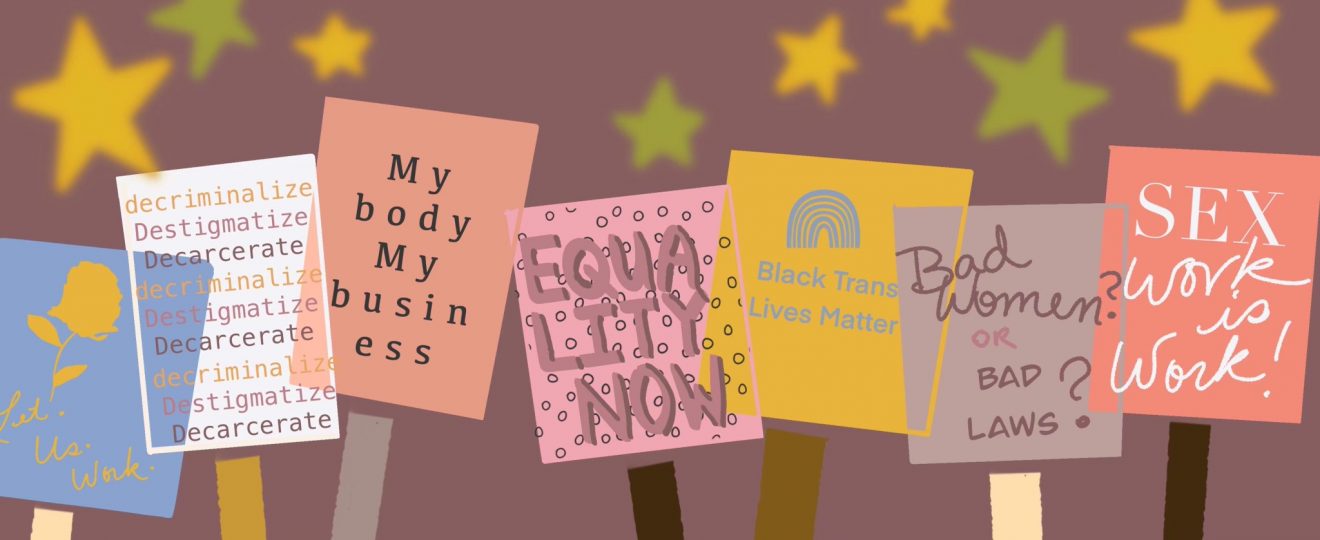I see my vagina every day. Gynecological examinations might not be part of my morning routine, yet every day, from the second I step into the shower to the last time I go to the bathroom, and during all those moments in between when I ponder if I’ll ever have sex again, I am consciously reminded of my vagina’s existence. Once a month, gelatinous blood on my underwear, I swallow ibuprofens like gummy bears and curse the biological nest inside of me, only to forget it is there the second the pain evaporates. Where my vagina is a spoilt little brat who gets all the attention, my uterus is the forgotten middle child who rarely crosses their mother’s mind. Still, my relationship with both organs is defined by the same identical premise: they are exclusively mine.
The principle of bodily autonomy and integrity – the articulate version of this very premise – defends the notion that women, and all LGBTQ+ individuals, have the agency to make decisions over their own bodies, including their reproductive systems, without unwarranted interference from third parties. A fundamental feminist tenet and an indispensable pillar of individual liberty, the precept has been notably wielded in the defense of abortion rights, as most recently reflected by the chorus of scathing condemnations that followed the Supreme Court’s decision to overturn Roe v. Wade. President Pedro Sanchez’s slogan-like reaction to the court’s ruling – “Women must be able to decide freely about their lives” – was one asterisk short of perfectly capturing many progressive organizations’ and individuals’ understanding of bodily autonomy. It was only missing the fine print.
Does my freedom end where my vagina begins?
For the Spanish government, and for a significant number of others, the answer is a damning yes. While enshrining the right to abortion as the ultimate proof of their respect for bodily autonomy, an overwhelming amount of self-proclaimed progressive politicians across the globe have continued to oppose the decriminalization of prostitution, treating sex work as an abhorrent practice undeserving of the protection extended by the principle. In Spain, for instance, the socialist coalition government (PSOE-Unidas Podemos) amended the existing abortion law in May, to provide easier access to pregnancy termination for individuals over the age of 16; a mere couple of weeks later, the same socialist government joined forces with the conservative party (PP) to push for an abolitionist legal framework towards prostitution that would drive the country further away from decriminalization. When it comes to reactionary political figures and movements, their opposition to sex work is everything but shocking: their rejection of the very notion of bodily autonomy – a terrifying glimpse of which can be seen in the Supreme Court’s Dobbs decision – underpins the authoritarian rationale used to repudiate both the right to abortion and decriminalization of prostitution. In a sickly twisted way, the conservative position is more ideologically consistent than the progressive stance.
So, is my uterus exclusively mine, but my vagina isn’t? Progressive movements and politicians have sought to disguise their capricious use of the principle of bodily autonomy by defining abolitionist approaches as justified intrusions into bodily agency. Where prohibitionism, as the term implies, entirely prohibits sex work and makes all associated practices illegal, abolitionist models allow the act itself of selling sex but criminalize related activities, such as buying, selling sex as a third party– commonly known as pimping–, and keeping brothels. Consent, according to the abolitionist logic, is inconceivable; the cisgender female sex worker, the subject at the center of the approach’s focus, is always the victim of some form of coercion, rendering prostitution a forced practice where government intervention is not only warranted, but imperative. Through a pseudo-feminist narrative riddled with savior-like undertones, the abolitionist stance obscures the implications of the framework, presenting it as the ultimate protection of women’s integrity while mischaracterizing some of the pivotal elements at play in the debate over the legal status of prostitution.
The notion that providing sexual services in exchange for money is degrading pervades the abolitionist argument. Following a MacKinnon-style understanding of sex, the fact that both parties must want to have sex directly rejects the idea that one could buy it or sell it, leading to the forcible objectification of the woman herself, and to her subsequent degradation. By claiming that consent– a necessary component of all sexual interactions defended by abolitionists and non-abolitionists alike– is incompatible with economic compensation, abolitionists implicitly argue that consent is only achievable through a desire to experience sex as the ultimate manifestation of romance, or at least, lust. When lacking either of these passions, the argument implies, sex ceases to be an act one could possibly want to engage in, and becomes a violation of an individual’s body; since neither romance nor lust can actually be bought, nor do they serve to describe the relationship between a prostitute and a client, prostitution can never be anything but forced. The convoluted abolitionist logicnot only echoes puritan conceptualizations of sex as an essentially impure act, but chooses to omit the fact that the human drive to sexually experience each other arises even in cases when romance and lust are not present. The desire to take revenge on the one who has cheated by cheating with someone else, solitude and tenderness, empowerment through the arts of seduction, those are only some of the dispositions that can move one to want sex – and economic ambitions might be one of them too. The omission of other motivations and the characterization of the sex worker as the eternal victim deny prostitutes a claim to agency, while coming dangerously close to suggesting that those who would be ready to exchange sex for money are just as dirty as the romanceless, lustless act itself.
Through its conceptualization of sex and consent, the abolitionist model establishes that a higher authority can have the last say in determining whether a sexual interaction was consensual or not. When that power is granted to the judiciary and the issue is sexual assault, we accept it as an imperfect mechanism to protect victims; when it is extended further, giving the state license to negate and disavow the opinion of the adult whose own consent is being questioned merely because the sexual interaction was a of a certain kind, we open the door to the erosion of fundamental liberties in the sphere of personal privacy. Where the involvement of the judiciary seeks to defend the principle of bodily autonomy by ensuring that individual consent is respected and recognized, the legal shift endorsed by abolitionists disregards it altogether, weaponizing the notion of consent to preemptively target those types of sexual encounters deemed to be conflicting with accepted sexuality. The authority the abolitionist approach bestows upon the state refers only to the case of prostitution, yet the logic underpinning it has alarming implications for all kinds of sexual interactions that have been historically oppressed, and specifically for the LGBTQ+ community. As far as my vagina goes, the model renders it state-controlled territory; it’s not quite exclusively mine.
In the face of criminalizing measures, of the disdain for the humanity of those directly affected, the last pro-choice cry rallies around the obvious albeit often ignored: abortion bans only end safe abortions. The theoretical ramifications of abolitionism, the puritan connotations of the model, may not concern or even appear evident to those who defend it; still, the real consequences of the legal framework are just as undeniable as those of anti-abortion regulations. The progressive politicians and movements who join in with the pro-choice chant while endorsing abolitionism stand closer to their reactionary counterparts than they would like to admit: abolitionism only makes existing sex work more unsafe to those who perform it. It does not end prostitution, it does not protect sex workers.
Despite the lack of conclusive evidence to support the claim that criminalization reduces trafficking and exploitation, abolitionist models have repeatedly leveled it to both defend their position and disregard the impact that criminalizing measures have on sex workers. By asserting that prostitution is incompatible with consent, and automatically removing the means aspect from the equation – that is, ignoring the elements that would consitute infringment of an individual’s consent, such as coercion – abolitionism conflates consensual sex work with forced sex work resulting from human trafficking. The resulting product is a legal approach that not only channels invaluable resources away from the urgent fight against trafficking, but one which fails to recognize the unique socioeconomic and personal factors at play in sex work. Prostitution does not occur in a vacuum; the ramifications of abolitionist criminalizing measures don’t either. Under abolitionism, overage children of sex workers – because sex workers do have children – if still dependent on their parents’s income, could legally be prosecuted for economically benefitting from the practice as a third party. Sex workers who use their own homes as their place of work could face forcible evictions from their landlords, as the latter could be charged for letting a premise where sex is sold. Prostitutes who seek to advertise their own services, or to work together for their own safety, could also be prosecuted for the promotion of sex work. To state, as the abolitionist model does, that these repercussions would protect sex workers is effectively an act of willing naivety; to gloss over their existence, over the fact that these are real consequences which do happen in abolitionist systems – insert one of the princesses of abolitionism, Norway – is nothing but a misleading depiction of the approach coated in blatant disrespect for sex workers’ humanity.
Abolitionism is a legal pitfall that just keeps getting deeper. The threat of legal action, alongside the stigmatization and marginalization stemming from criminalization, not only render sex workers more vulnerable to physical and sexual violence, but discourage them from reporting instances of abuse. As law enforcement officials have repeatedly partaken in the violence experienced by prostitutes, even in countries where performing sex work itself is not criminalized, such as Hong Kong, sex workers lack official support mechanisms they can trust and turn to when trapped in these cycles of abuse. Transgender female sex workers – whose situation is neglected by the heteronormative and cisgender lens applied by the abolitionist analysis – are disproportionately targeted by violent behavior, and their stigmatization is exacerbated by the intersection of their profession and their identity, as is the case of other minority sex workers, such as immigrants, people of color, and other LGBTQ+ individuals. Beyond the direct mistreatment experienced by prostitutes, the criminalizing measures endorsed by abolitionism, contribute to an ongoing health crisis among sex workers: according to the World Health Organization, sex workers are more likely to suffer from sexually transmitted diseases and blood-borne infections, with female prostitutes being around 30 times more likely to be living with HIV than other women of reproductive age.
That was only a brief summary.
An increasing number of organizations, including Amnesty International, the Global Alliance Against Traffic in Women, the American Civil Liberties Union, the World Health Organization, and Human Rights Watch have called for the decriminalization of sex work. Their stance, unlike that of the many progressive governments endorsing abolitionism, comes from years of extensive research into current legislation across the globe and the implications of existing approaches. Regardless of whether one agrees with the theoretical version of abolitionism or not, one ought to wonder why, despite being faced with the overwheling weight of the reality of abolitionism, liberal politicians continue to support it.
Is it the legacy of the historical vilification of sexual women? The reminder that sex, the element used to oppress women, the element which could never be fully controlled by men, is still something women will always be able to weaponize, to grant and hold back at their own will?Is it the shattering of the romantic myth? Our own animal nature bursting open before us, pointing at the fact that sex is merely a physical act with no intrinsic meaning and that the Disney tutu we have tried to force it into is ripping at the seams? Is it the capitalist nightmare bearing its teeth? The idea that if we accept that sex can be sold we will actually be recognizing that our entire system demands us to give our own selves up for survival? Is it the madonna fighting the whore on the floor? The patriarchal understanding of femininity still lurking behind the sexual revolution’s glow, determining by how much women can break out of the mold? Is it the monopolized version holding its breath? The fear that if we continue to analyze sex work we will come to realize that monopolized prostitution has existed for centuries, that marriage was a contractual economic agreement women had to enter in order to subsist? The gods up in the sky telling us right from wrong, sex still dripping impurities on the kitchen floor?
I do not know. And yet, looking down at my underwear, my legs almost crossed, I know that my vagina is not solely my own.







This thought-provoking piece highlights the complexities of bodily autonomy and the contrasting attitudes towards abortion and sex work. 🤔 It’s crucial to recognize that true autonomy means respecting individuals’ choices about their bodies, including their right to engage in sex work without stigma or legal repercussions. Empowering all individuals to make decisions about their own lives is essential for a truly progressive society. 🌟✊